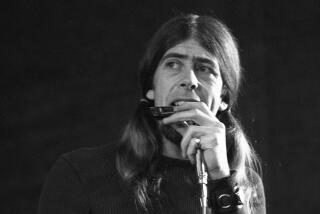JAZZ/BLUES REVIEW : Marsalis Steps to the Front of Class at Center
- Share via
COSTA MESA — Branford Marsalis didn’t tell his enthusiastic audience Saturday night at Segerstrom Hall in the Orange County Performing Arts Center that he was conducting a “Blues 101” class, but he might have.
The heralded saxophonist and “Tonight Show” bandleader led his entourage through half a dozen styles of the classic genre, several taken from his recent Columbia album, “I Heard You Twice the First Time.” These pieces ranged from the ‘20s and ‘30s field holler folk approach of Robert Johnson and the ‘30s jazz vein (W.C. Handy’s “St. Louis Blues”), to modern urban numbers (T-Bone Walker’s “Stormy Monday”) and a pair of state-of-the-art contemporary jazz interpretations.
The leader, his quartet--pianist Kenny Kirkland, bassist Bob Hurst and drummer Jeff Watts--and special guests Russell Malone on guitar and vocalist Linda Hopkins were undaunted by the artistic challenges posed by such an odyssey. They delivered performances that were generally captivating, though a couple of numbers--Hopkins’ vocal on “Meet Me With Your Black Drawers On” was one--were uninvolving and forgettable.
The program started with the aggressive and spirited “Blues in C,” a today-style free-for-all that swung handily, and from there, wended its way back through various musical time zones.
The opener, which was an updated version of the style of blues John Coltrane played in the ‘60s and which began at medium speed and got faster, found Marsalis working out on tenor saxophone, delivering his statements with an increasingly personal sound that was sometimes warm and round, sometimes gruff and crying. He played ideas that ran from spontaneous bursts that seemed to gush from his horn to brief statements separated from each other by long pauses and compelling high-register tones.
Kirkland, Hurst and Watts set the tone for their accompaniments for the concert on “Blues in C,” working with verve behind the leader, then keeping the heat on when the pianist improvised. Kirkland, who eschews the obvious in favor of the oblique, offered hard-hit lines that pushed the envelope of the blues form, threatening to careen out of control but never going that far.
Following a relaxed version of “St. Louis Blues,” where Marsalis emitted a full, ripe soprano sax tone that recalled the great Sidney Bechet, the musicians took on another demanding, modern number, “Stretto From the Ghetto.” In “Stretto” they sometimes played in different times (Hurst and Marsalis fast, Watts at half speed, for example) simultaneously, then would merge and work in the same meter. Again the improvisations by Marsalis and Kirkland were exhilarating, the latter evoking the style of Thelonious Monk by employing wide-spaced intervals and bright chords.
Malone displayed his affection for be-bop style blues on “Blues on F,” which featured his glowing, Wes Montgomery-like chords and sweeping, up-and-down-the-guitar lines. He revealed his depth when he played acoustic, steel-stringed guitar on “Rib Tip Johnson,” an adaptation of the early folk blues style. Here Marsalis dropped in some robust yet pleading soprano statements that were both spare and remarkably effective.
Hopkins, her voice shining like a Kleig light throughout, roused listeners with her first number, where Marsalis soloed in an R&B; manner. Then she faltered as she took on “Meet Me,” where she started at top volume and stayed there, avoiding the dynamics that make this song work. The band’s routine backing didn’t help, either.
More to Read
The biggest entertainment stories
Get our big stories about Hollywood, film, television, music, arts, culture and more right in your inbox as soon as they publish.
You may occasionally receive promotional content from the Los Angeles Times.










